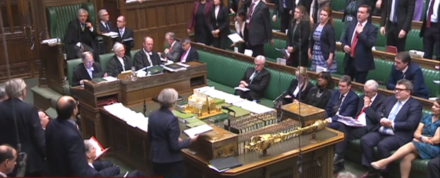
Today MPs start voting on the Brexit-softening House of Lords amendments to the EU Withdrawal Bill. Whether the Commons passes any of the 15 amendments will determine the course of Brexit.
The most important is arguably the ‘meaningful vote’ amendment. If passed, it would be up to parliamentarians – not the cabinet – to decide what happens should the final deal get voted down (likely as a result of failing Keir Starmer’s six tests). As the Shadow Brexit Secretary outlines in an op-ed for The Guardian today, this amendment would “take no deal off the table once and for all”. Without it, the Commons vote on Theresa May’s deal is redundant and parliament has no real control over Brexit.
The Prime Minister has to crush the saboteurs, aka her own Remainer Tory MPs, in order to keep control of the process. To help save her from a crucial defeat, rebel Dominic Grieve has tabled a new compromise amendment at the last moment. His proposal would force ministers to consult the Commons on a fresh Brexit plan should the November 30th deadline for agreement on the deal be missed. Parliament would determine the next steps only if the government still couldn’t find an improved deal by mid-February 2019. But the government has its own much more watered-down version of the meaningful vote amendment, so it looks unlikely Grieve’s eleventh-hour idea will be accepted.
Meanwhile, Labour is still arguing over the EEA amendment, due to be voted on tomorrow. It’s another chance to embarrass the PM, but unlikely to get anywhere because the party won’t back it. According to the core Labour Remainer group, many of whom are associated with Open Britain and Labour Campaign for Single Market, at least 70 MPs are ready to rebel on the EEA. They claim the EEA amendment would pass if the Labour leadership urged the PLP to vote for it.
But Jeremy Corbyn, Keir Starmer and Corbynsceptic Labour MPs from Leave-voting constituencies are all agreed – it’s a no from them. The latter have confirmed their anti-EEA position in a letter to Corbyn coordinated by Gloria de Piero, Ruth Smeeth, Caroline Flint and Gareth Snell. In a piece for LabourList, Snell sets out their main arguments, principally that Labour would lose support in key seats should it support the EEA. “My constituents could rightly ask whether we have really left the EU if we are still subject to all the rules, regulations and obligations that come from membership,” says the MP for the marginal seat of Stoke-on-Trent Central.
Bored by Brexit? I don’t blame you. But it’s worth keeping a close eye on events over the next two days. After all, the party is unified behind one idea: the message Labour sends to the electorate on Brexit may determine the outcome of the next general election. While pro-EU members are disappointed that Labour won’t call for a ‘people’s vote’ referendum on the final deal, others are too worried about how we could possibly adopt such a position and also win an election. Because winning means not just piling up stonking majorities in London and in university towns, but also holding onto marginal Leave constituencies and regaining key seats such as Mansfield and North East Derbyshire. With the government making such a mess of Brexit negotiations, and a transition period now inevitable, these questions are set to dominate debate in the party for years to come.
Sienna @siennamarla
Sign up to LabourList’s morning email for everything Labour, every weekday morning.




More from LabourList
‘Tackling poverty should be the legacy of Keir Starmer’s government’
‘The High Court judgment brings more uncertainty for the trans community’
‘There are good and bad businesses. Labour needs to be able to explain the difference’